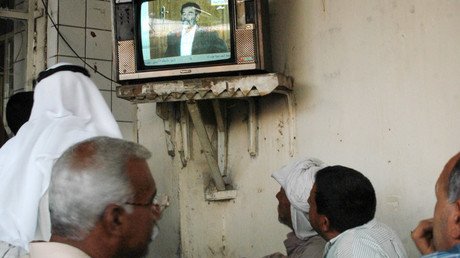Making Al-Qaeda propaganda for Pentagon: Ex-PR worker describes secret campaign to RT
A former employee of the UK PR firm that was hired by the Pentagon to create fake terrorist videos in Iraq told RT that he arrived thinking he would be working with media agencies, but ended up creating materials for a secret propaganda campaign instead.
Bell Pottinger’s staff was stationed inside a highly secured US military and intelligence HQ at Camp Victory in Baghdad.
“The arrival there [in Camp Victory in Iraq] was quite a shock… very very, I guess, distressing, really… You just felt you as if you didn’t know what was going to happen,” Martin Wells, a former employee of Bell Pottinger who worked for the US military in Iraq from 2006 to 2008, told RT.
The news that the Pentagon had paid Bell Pottinger over half a billion dollars to create fake terrorist videos in Iraq hit the headlines on Sunday when it was divulged by the Bureau of Investigative Journalism, which had received the information from Wells.
Wells says that he was initially told that he would be working on news.
Fake news and false flags: How the #Pentagon paid a British PR firm $500M for top secret Iraq propaganda https://t.co/Wg86h9GXrYpic.twitter.com/9q45cOJ1ZI
— The Bureau (@TBIJ) October 2, 2016
“As it transpired, it was news, but not news as I expected. I expected it to be doing stuff for news agencies such as yourselves and Reuters. And just providing footage for them,” he said.
However, the reality turned out to be quite different from what the video editor had anticipated. Wells said that when he arrived at his workplace, he was introduced to the American intelligence staff there.
“I still at that point had no idea what I was doing, but I knew as soon as I walked through that door I certainly wasn’t doing news… Then, later as I went through… and worked out what I was actually doing, it transpired that it was essentially… a form of propaganda.”
The media was set completely abuzz when it was revealed that the Pentagon had paid Bell Pottinger $540 million for contracts from 2007 to 2011, with another contract for $120 million signed in 2006. The firm ended its work with the Pentagon in 2011.
Bell Pottinger is known for serving an array of controversial clients, including the Saudi government and Chilean dictator Augusto Pinochet’s foundation.
The firm reported to the CIA, the National Security Council, and the Pentagon on the project, with a mandate to portray Al-Qaeda in a negative light and track suspected sympathizers. Critics claim, however, that the videos may have actually promoted the terrorists’ agenda instead.
The Bell Pottinger operation, which began soon after the US invasion of Iraq, was tasked with promoting “democratic elections” for the administration before moving on to more lucrative psychological and information operations.
The firm created television ads showing Al-Qaeda in a negative light, as well as content which looked as though it had come from “Arabic TV.” The videos were created to play on Real Player, which needs an internet connection to run. The CDs were embedded with a code linked to Google Analytics that allowed the military to track the IP addresses the videos were played on.
They would also craft scripts for Arabic soap operas in which characters would reject terrorism with favorable consequences. The firm also created fake Al-Qaeda propaganda videos, which were then planted by the military in homes that they raided.
“In terms of the [fake Al-Qaeda] VCDs, I was the only one, who while I was there, cut those. Nobody else was tasked with those because I was running the department. The footage was also given to us, and it was genuine Al-Qaeda footage that they’d shot, and we then repurposed this for our footage to put on the VCDs and then went out and dropped them,” he explained.
“Most of the stuff we did went out on local news, on national news, and would be broadcast in different countries in the region. But the VCDs were targeted at Al-Qaeda themselves. That was used by marines – left of raids amongst a bunch of VCDs people had been using anyway. If you watched that when it opened up, it was on a player that was linked to an analytical site, so wherever in the world you watched it, it could be tracked. So you’d know where it was played, and the IP address would flash up, so you’d basically know who had watched it,” he said.













